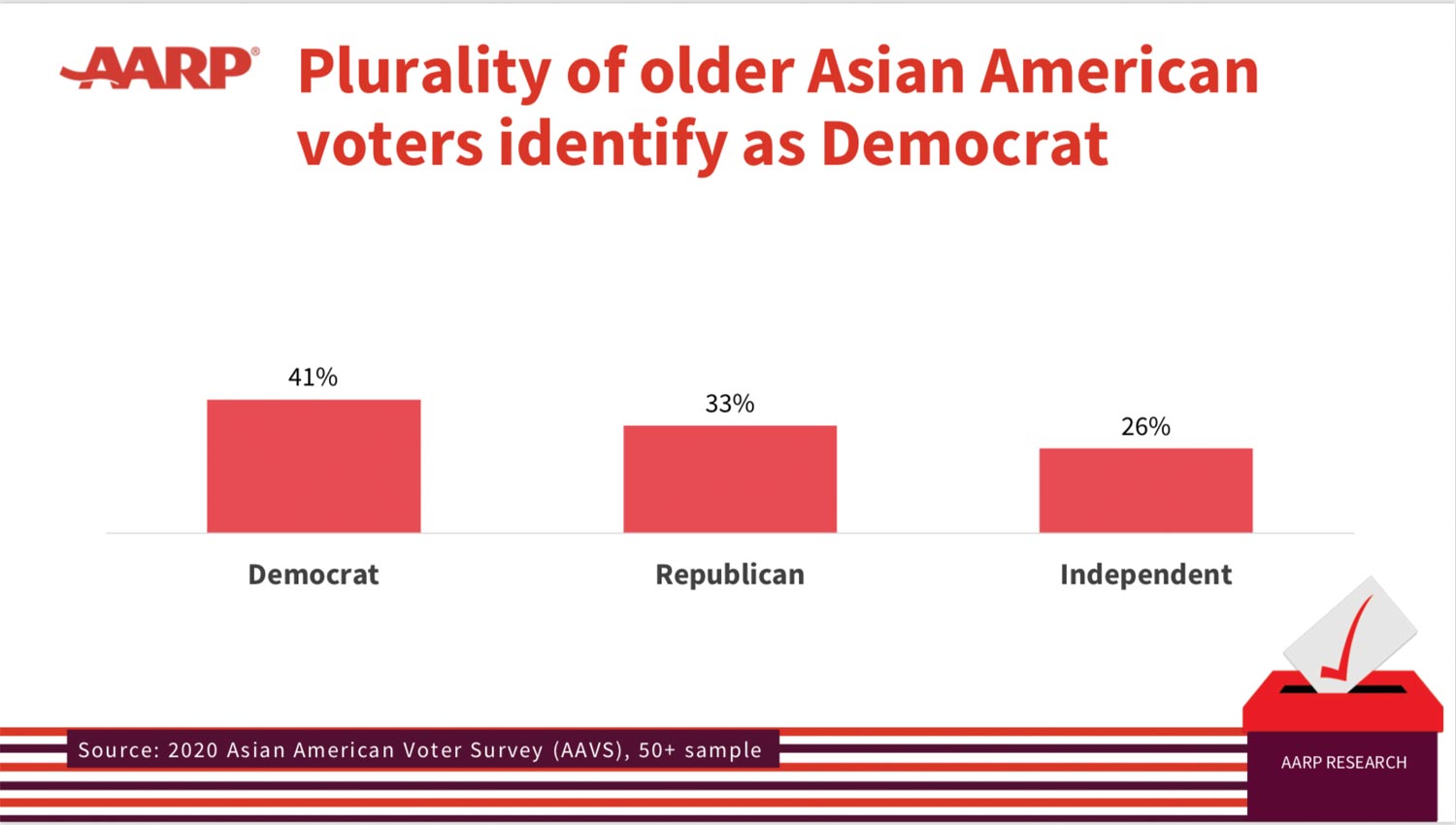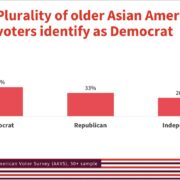
WHAT issues are top of mind for Asian American registered voters over the age of 50 going into Election Day?
Health care (93%), jobs and the economy (89%), education (87%) and national security (87%) are among the concerns Asian American voters rated as “extremely” or “very” important, according to findings released by AARP, the nation’s largest nonprofit, nonpartisan organization for Americans 50 and older, on Wednesday, October 21.
The findings come some eight months in the pandemic, as the Asian American community has experienced the effects of COVID-19, whether through hate crimes, business downturn, or being disproportionately high rates of infection.
Going into specific health-related topics, 58% of voters said addressing the coronavirus is a top priority, while 54% said securing the future of Social Security is “extremely” important” and 53% want to see lower health care costs.
“To win, candidates must really talk about the issues that matter to the 50-plus voters — voting safely from home, preventing cuts to Social Security and Medicare and lowering drug prices,” said Joseph Liu, director of campaign strategy and management at AARP on Wednesday, adding, “If the polls are to be believed, they may be the biggest swing vote casting their ballots for candidates, taking COVID as seriously as they are, regardless of party or political labels.”
The data are based on results from the 2020 Asian American Voter Survey — released in September by APIAVote, AAPI Data and Asian Americans Advancing Justice | AAJC — and AARP’s “National Survey of Older Voters During COVID-19: Asian Americans” conducted in March.
With Asian Americans comprising the fastest-growing racial and ethnic voter bloc in the United States, individuals in the 50-plus segment, particularly those who are foreign-born, are the ones leading in voter registration and turnout.
The results found that voter registration among eligible Asian American voters increases with age, with the 45-64 segment at 58%, 65-74 at 60% and 56% for those over 75. In contrast, the 18-24 segment is at 45% and 24-44 at 52%.
“Among Hispanics and among Asians, the foreign-born are the more reliable segments of voters. They are the ones turning out at higher rates on Election Day,” said Angela Houghton, senior research advisor of multicultural research at AARP. “They are predominately an immigrant electorate.”
Going into the party identification, 41% of older voters identified as Democrats, while 33% said they are Republicans and 26% independent. But the majority identify as “moderate” (58%), while 26% say they’re “conservative” and 16% identify as “liberal.”
“Looking back over the midterm elections as well as the 2016 presidential election year, we didn’t see a lot of change in terms of party identification in this group of voters,” Houghton said. “There’s more cohesion around an ideology with this group of voters than there is in a party identification.”
Despite the enthusiasm and party identification, a majority of voters are not being engaged or contacted by the Democratic or Republican parties or community organizations.
The findings did not show the breakdown of support for the presidential candidates or any other races, but Asian American voters largely said they are looking for an elected official that “exhibits integrity, honesty, and moral character” (56%), “understands deeply the day to day issues of ordinary Americans” (52%), and “prioritizes getting things done above the political party ideology” (52%).
“One of the things that have been continuing to plague the AAPI community is that we’re invisible and that also comes true when it comes to elections and political parties as well. We constantly have to make the case through data,” said Daphne Kwok, vice president of multicultural leadership for AAPI audience strategy at AARP. “They need to hear what are our issues, what are our concerns…and that we all need to be taken seriously and that our needs need to be addressed and spoken to.”
Meanwhile, the 2020 Asian American Voter Survey, which tapped Asian American registered voters 18 and older, further disaggregated findings by the subgroups. Sixty-two percent of Fil-Am voters said they are “more enthusiastic” than they were in previous cycles, the highest level of support compared to the Chinese, Indian, Korean, Japanese and Vietnamese groups surveyed.
When asked who they are “inclined to vote for” in the presidential race, 54% of Asian Americans are leaning toward former Vice President Joe Biden, while 30% would back a second term for President Donald Trump. Among Fil-Ams, 52% back Biden, while 34% support Trump — the second highest support among the groups after 48% of Vietnamese voters who said they would re-elect the current president.
Safe voting plan
The data sets found that more older voters plan to vote in person (51%) compared to 46% who will opt for the mail or absentee ballot option.
Given the COVID-19 pandemic and influx of disinformation on social media and other sources, AARP is advising older voters to make a plan to safely vote — either by mail-in ballot or in-person by following measures like wearing a mask to the polls — and to be cognizant about news consumption. Seventy-six percent of voters prefer traditional news sources, while 50% look at candidate debates and town halls to make voting decisions and 42% seek conversations with friends and family.
When asked about voter safety, 46% said they “worry often” about any interference this November, while 40% relayed concerns about health and safety at the polls.
“We’re living in the middle of a pandemic and there’s been a lot of misinformation and disinformation campaigns out there about voting absentee, and is it going to be safe to go to the polls? We’re seeing these competing concerns,” Houghton explained.
Liu added that the most effective ways to combat misinformation in the older segment are trusted messengers, like ethnic media, and repetition.
“The more you call out the falsehoods, cover the stories and correct the record, the more informed our community will be,” he said. “So covering these issues is so important and don’t stop telling the truth between now and the election.”






